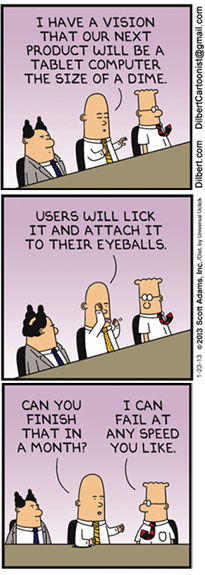 Did you ever find yourself repeatedly using a phrase, only to later discover it is meaningless, misleading, or simply wrong? I find these phrases often have meaning when they first come out, but take the wrong road once the prevailing zeitgeist takes ownership.
Did you ever find yourself repeatedly using a phrase, only to later discover it is meaningless, misleading, or simply wrong? I find these phrases often have meaning when they first come out, but take the wrong road once the prevailing zeitgeist takes ownership.
Today, I want to ask all of you that are using the phrase “Fail fast, fail often” to stop. Having worked a significant time in the corporate innovation space, I hear this phrase several times a week. The idea behind fail fast, fail often is that failure creates learning opportunities. When these learning opportunities are done early enough in the product creation cycle they can help you avoid making bigger mistakes later, when the stakes are higher.
Great idea; mom and apple pie. But that’s the problem, it’s so mom and apple pie that it becomes easy to say without understanding the complexities of what it requires to implement.
 I’ve worked for several companies where associates would tell me, “We could never innovate. Our company is too scared to fail.” There’s a reason for that – when they have failed in the past it cost them dearly. They have been Pavloved into equating failure with inevitable pain. So when we say, “Fail fast, fail often” why would we expect anything other than a door slam from our executive team?
I’ve worked for several companies where associates would tell me, “We could never innovate. Our company is too scared to fail.” There’s a reason for that – when they have failed in the past it cost them dearly. They have been Pavloved into equating failure with inevitable pain. So when we say, “Fail fast, fail often” why would we expect anything other than a door slam from our executive team?
The good news is that these leaders are starting to buy into the goodness of fail fast, fail often. The bad news is that these leaders are starting to buy into the goodness of fail fast, fail often. That is, they are embracing the idea of failure as a part of business, to the point that we now have companies bragging about their failures.
We are missing the point.
Failure without learning is simply failure. We make a natural assumption that when we fail we will learn from it. How did that work for you growing up? Companies are no different. They have to be taught to learn.
MIT professor Peter Senge has made his life’s work the study of learning organizations. In his 1990 bestseller The Fifth Discipline, Senge demonstrates that leaders must take purposeful actions to create
a learning organization. Learning requires a concerted effort to instill the discipline of inculcating failure’s lessons. It is far easier to learn how to fail than it is to learn from that failure and memorialize the learnings.
The problem with fail fast, fail often is that it has things in the wrong order. You shouldn’t be advocating failure if you don’t have the capacity to learn. I contend that the phrase should be “Learn Fast, Learn Often,” but it will never take off. It doesn’t have the cognitive dissonance that fail fast, fail often does and it’s too hard to admit that you are not already learning from your mistakes. But, most organizations are not setup to learn.
There are many corporate antibodies to learning. Do any of these look familiar?
Denial – You can’t learn if you can’t accept you may be wrong. According to Matthew Syed, author of Black Box Thinking, denial increases as you go up the corporate ladder. The top execs are often the ones with the most to lose by being wrong and have intimate control over the PR machine to create a reality distortion field.
Impulsivity – Scientists are now discovering that some people are physiologically less capable of learning from their mistakes than others. This function appears to be correlated to impulsiveness. Never Enough Time for Instrumentation – Under constant pressure to deliver faster, leaders often fail to recognize the importance of creating the framework and instrumentation necessary so that the product can teach its creators as it is being developed. It isn’t a feature that the customers will pay for, so, much like the training budget it is one of the first things to get cut.
Never Enough Time for Instrumentation – Under constant pressure to deliver faster, leaders often fail to recognize the importance of creating the framework and instrumentation necessary so that the product can teach its creators as it is being developed. It isn’t a feature that the customers will pay for, so, much like the training budget it is one of the first things to get cut.
No Retrospects – Software development has the concept of retrospects. These are regularly scheduled meetings that are designed for one purpose – to learn from their latest efforts. They separate the individuals from the systems and events and concentrate on how they can improve the next development cycle. I don’t think I have ever seen these done at an upper management level, let alone the executive team. Most of the exec meetings I have attended where we tried to learn from our mistakes felt like Salem, Massachusetts in 1692.
The list goes on. I am sure you have a few of your own and that’s the point. A significant portion of corporate America is not designed to learn.
If you think your company is too afraid to fail, look at why. Are they really good at learning from their mistakes or do you see the same mistakes propagated over and again? If it’s the latter, you shouldn’t be preaching fail fast, fail often – you should fear it.






